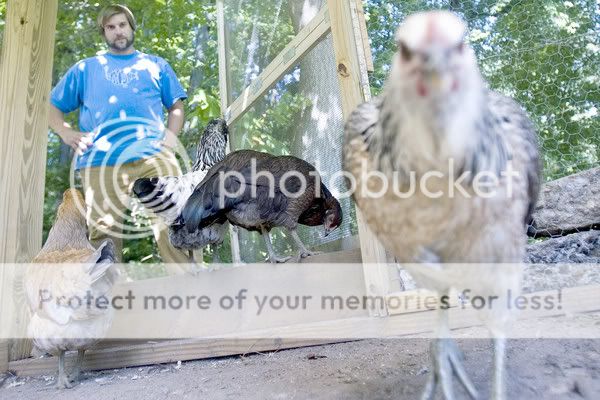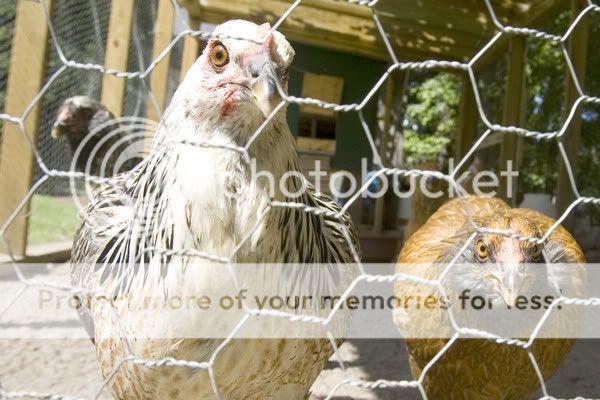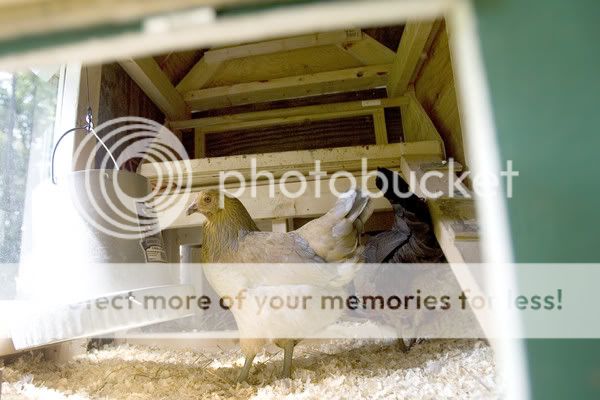http://www.dailypress.com/features/family/dp-gl_chickens_0920sep20,0,7213938,full.story

A Newport News couple brings chickens home to roost.
Adam Bollinger and his girlfriend Erica McFaddin spent 22 weeks patiently waiting for it.
Then one recent afternoon, it arrived. Bollinger stepped into the couple's Newport News backyard and spied a perfect little pale-blue oval resting precariously inside his homemade chicken run.
One of his five chickens named Paula Deen after the sassy Southern television chef finally did what nature says hens are supposed to do.
"I went out there to take them a little snack ... and there it was sitting on the ground," Bollinger said of his very first home-raised egg. "It wasn't even up in the nest boxes. It's a little smaller than the regular egg a practice egg, I guess."
The size didn't matter.
"I was proud and excited at the same time. I've been waiting a while for that to happen."
Bollinger and his girlfriend are new to chicken wrangling. But if press accounts are any indication, the Newport News couple are part of national trend. For years, enthusiasm for the idea of keeping chickens in urban and suburban areas has been building, news reports say.
After deciding to try chickens for both eggs and companionship, Bollinger and McFaddin bought their first baby birds in April. The five 1-day-old chicks arrived and eventually learned to live in a fenced-in, sheltered run that Bollinger constructed with help from a friend and advice from Internet forums and reference books such as "Raising Chickens for Dummies" by Kimberly Willis with Rob Ludlow.

Today, the couple's five young hens Mother Theresa, Surfin' Bird, Bearded Lady, Queen Latifah and Paula Deen cluck comfortably in the pen which is tucked into a shady corner of the couple's large lot off Maxwell Lane.
Bollinger built a small window on one side of the coop so he can peer inside. The whole operation is neat and surprisingly odor-free.
"They're relatively clean, cleaner than you'd think," Bollinger said, who rakes out the run twice a week. He says he's confident that his small chicken run is in compliance with local laws.
Bollinger's first egg arrived the second week of September and has since been followed by several more.
"It's just another way of producing food," Bollinger said of his first experiment with animal husbandry. "It's like a garden if you asked me. But instead of vegetables, you're producing protein ... We're working on collecting recipes for omelets and for egg salad."
It's difficult to know how many people on and around the Peninsula are, like Bollinger, keeping chickens. Since local laws govern where and if livestock can be kept around residences, some owners may keep hens on the down low.
City officials in Hampton and Newport News said they've seen no increase in questions about rules regarding chickens and no increase in complaints about them. "I don't know if we have a problem," said Harold Roach, director of codes compliance for Newport News. "It hasn't risen to our attention yet."
But in Smithfield, a livestock supply clerk says she's seen a definite upsurge in first-timer interest.
"We're seeing more and more new people, we're selling a lot of the supplies," said Marie Clark with Southern States Farmers Service Co.
Clark advises newbies about everything they'll need from feeders to remedies for lice and worms.
"My favorite question is 'Do I have to have a rooster to get an egg?' I tell them, 'No. The rooster is only for making more chickens.'"
She doesn't attribute the spike to any sort of fad. She says it's all dollars and cents. "I think more people are interested because everything's so high," Clark said. "People who had never had gardens before were trying it this year. Same with chickens. They want the eggs."
On the national level, there's a wealth of evidence that chicken fervor is building. Web sites such as Backyardchickens.com
 and Urbanchickens.net where chicken lovers trade tips and experience have flourished.
and Urbanchickens.net where chicken lovers trade tips and experience have flourished.
This spring, the Associated Press reported that livestock feed and pet food maker Purina Mills is seeing double-digit growth for its small, 5-pound bag of all-natural poultry feed marketed since 2003 to people who raise small flocks for eggs or as pets.
News stories emanating from the West Coast and Northeast suggest that those regions are centers of urban chicken activity. But the fever seems to be spreading.
In Atlanta, Andy Schneider hosts an Internet radio show called "Backyard Poultry with the Chicken Whisperer" and has published a pair of books "Chicks are Easy" and "Peep Show."
National Public Radio has reported that a community garden in Atlanta offers a class called "Chicks and the City" which teaches where to get the birds and what to feed them as well as coop designs and tips for thwarting predators such as hawks, raccoons and dogs.
"With the way the economy is going, people like the idea they can have access to quality eggs and meat right from their backyard, if they need to," Rob Ludlow, a California resident who owns Backyardchickens.com
 , told the Associated Press. But, he added, "It's actually a misconception that it's cheaper to raise your own chickens for the eggs and meat." Chicks cost about $2 to $5 each, he said, plus chicken owners have to pay for a cage or coop, a chicken run and a feeder and waterer.
, told the Associated Press. But, he added, "It's actually a misconception that it's cheaper to raise your own chickens for the eggs and meat." Chicks cost about $2 to $5 each, he said, plus chicken owners have to pay for a cage or coop, a chicken run and a feeder and waterer.
Bollinger, 36, said he keeps chickens for many reasons that aren't financial: better food, a reduced carbon footprint, and because he likes taking care of the birds. As a kid, he volunteered at Bluebird Gap Farm in Hampton and found he enjoyed the company of fowl.
Paula Deen doesn't have to worry about ending up in a frying pan, either. Bollinger said he and his girlfriend are hungry only for eggs.
"We're definitely attached to them," he said of his small flock. "We got them when they were a day old. Any time you get something and raise it up from a baby you're going to get attached."
He recommended that anyone considering backyard chickens should do his homework before bringing home chicks. They're pets with benefits, it's true, but work, worry and responsibility goes along with keeping the birds.
"Like any pet, it's definitely a commitment," Bollinger said. "But if you get tired of them you could eat them. But we wouldn't do that."
News to Use
The municipal code sections for both Hampton and Newport News regarding the keeping of chickens are nearly identical. Here's what the law says:
"It shall be unlawful for any person to maintain in the city any poultry or animal within 175 feet of any buildings used for residential purposes or within 250 feet of any church or school building; provided, however, that the person maintaining such yard may do so within 175 feet of such person's own personal residence, and further provided, that this subsection shall not apply to the keeping of pigeons.
... Every person maintaining a poultry or animal yard shall keep the same clean and sanitary and free from all refuse, decaying food and excrement.
... Every poultry or animal yard, except when located in an area zoned agricultural under any existing zoning ordinances, shall be adequately enclosed and free from any rodents. The presence of any rodent in any poultry or animal yard shall be prima facia evidence that such yard is maintained in violation of this section."
For more on keeping chickens in urban areas, visit Backyardchickens.com or Urbanchickens.net

A Newport News couple brings chickens home to roost.
Adam Bollinger and his girlfriend Erica McFaddin spent 22 weeks patiently waiting for it.
Then one recent afternoon, it arrived. Bollinger stepped into the couple's Newport News backyard and spied a perfect little pale-blue oval resting precariously inside his homemade chicken run.
One of his five chickens named Paula Deen after the sassy Southern television chef finally did what nature says hens are supposed to do.
"I went out there to take them a little snack ... and there it was sitting on the ground," Bollinger said of his very first home-raised egg. "It wasn't even up in the nest boxes. It's a little smaller than the regular egg a practice egg, I guess."
The size didn't matter.
"I was proud and excited at the same time. I've been waiting a while for that to happen."
Bollinger and his girlfriend are new to chicken wrangling. But if press accounts are any indication, the Newport News couple are part of national trend. For years, enthusiasm for the idea of keeping chickens in urban and suburban areas has been building, news reports say.
After deciding to try chickens for both eggs and companionship, Bollinger and McFaddin bought their first baby birds in April. The five 1-day-old chicks arrived and eventually learned to live in a fenced-in, sheltered run that Bollinger constructed with help from a friend and advice from Internet forums and reference books such as "Raising Chickens for Dummies" by Kimberly Willis with Rob Ludlow.

Today, the couple's five young hens Mother Theresa, Surfin' Bird, Bearded Lady, Queen Latifah and Paula Deen cluck comfortably in the pen which is tucked into a shady corner of the couple's large lot off Maxwell Lane.
Bollinger built a small window on one side of the coop so he can peer inside. The whole operation is neat and surprisingly odor-free.
"They're relatively clean, cleaner than you'd think," Bollinger said, who rakes out the run twice a week. He says he's confident that his small chicken run is in compliance with local laws.
Bollinger's first egg arrived the second week of September and has since been followed by several more.
"It's just another way of producing food," Bollinger said of his first experiment with animal husbandry. "It's like a garden if you asked me. But instead of vegetables, you're producing protein ... We're working on collecting recipes for omelets and for egg salad."
It's difficult to know how many people on and around the Peninsula are, like Bollinger, keeping chickens. Since local laws govern where and if livestock can be kept around residences, some owners may keep hens on the down low.
City officials in Hampton and Newport News said they've seen no increase in questions about rules regarding chickens and no increase in complaints about them. "I don't know if we have a problem," said Harold Roach, director of codes compliance for Newport News. "It hasn't risen to our attention yet."
But in Smithfield, a livestock supply clerk says she's seen a definite upsurge in first-timer interest.
"We're seeing more and more new people, we're selling a lot of the supplies," said Marie Clark with Southern States Farmers Service Co.
Clark advises newbies about everything they'll need from feeders to remedies for lice and worms.
"My favorite question is 'Do I have to have a rooster to get an egg?' I tell them, 'No. The rooster is only for making more chickens.'"
She doesn't attribute the spike to any sort of fad. She says it's all dollars and cents. "I think more people are interested because everything's so high," Clark said. "People who had never had gardens before were trying it this year. Same with chickens. They want the eggs."
On the national level, there's a wealth of evidence that chicken fervor is building. Web sites such as Backyardchickens.com

This spring, the Associated Press reported that livestock feed and pet food maker Purina Mills is seeing double-digit growth for its small, 5-pound bag of all-natural poultry feed marketed since 2003 to people who raise small flocks for eggs or as pets.
News stories emanating from the West Coast and Northeast suggest that those regions are centers of urban chicken activity. But the fever seems to be spreading.
In Atlanta, Andy Schneider hosts an Internet radio show called "Backyard Poultry with the Chicken Whisperer" and has published a pair of books "Chicks are Easy" and "Peep Show."
National Public Radio has reported that a community garden in Atlanta offers a class called "Chicks and the City" which teaches where to get the birds and what to feed them as well as coop designs and tips for thwarting predators such as hawks, raccoons and dogs.
"With the way the economy is going, people like the idea they can have access to quality eggs and meat right from their backyard, if they need to," Rob Ludlow, a California resident who owns Backyardchickens.com

Bollinger, 36, said he keeps chickens for many reasons that aren't financial: better food, a reduced carbon footprint, and because he likes taking care of the birds. As a kid, he volunteered at Bluebird Gap Farm in Hampton and found he enjoyed the company of fowl.
Paula Deen doesn't have to worry about ending up in a frying pan, either. Bollinger said he and his girlfriend are hungry only for eggs.
"We're definitely attached to them," he said of his small flock. "We got them when they were a day old. Any time you get something and raise it up from a baby you're going to get attached."
He recommended that anyone considering backyard chickens should do his homework before bringing home chicks. They're pets with benefits, it's true, but work, worry and responsibility goes along with keeping the birds.
"Like any pet, it's definitely a commitment," Bollinger said. "But if you get tired of them you could eat them. But we wouldn't do that."
News to Use
The municipal code sections for both Hampton and Newport News regarding the keeping of chickens are nearly identical. Here's what the law says:
"It shall be unlawful for any person to maintain in the city any poultry or animal within 175 feet of any buildings used for residential purposes or within 250 feet of any church or school building; provided, however, that the person maintaining such yard may do so within 175 feet of such person's own personal residence, and further provided, that this subsection shall not apply to the keeping of pigeons.
... Every person maintaining a poultry or animal yard shall keep the same clean and sanitary and free from all refuse, decaying food and excrement.
... Every poultry or animal yard, except when located in an area zoned agricultural under any existing zoning ordinances, shall be adequately enclosed and free from any rodents. The presence of any rodent in any poultry or animal yard shall be prima facia evidence that such yard is maintained in violation of this section."
For more on keeping chickens in urban areas, visit Backyardchickens.com or Urbanchickens.net
Last edited:










